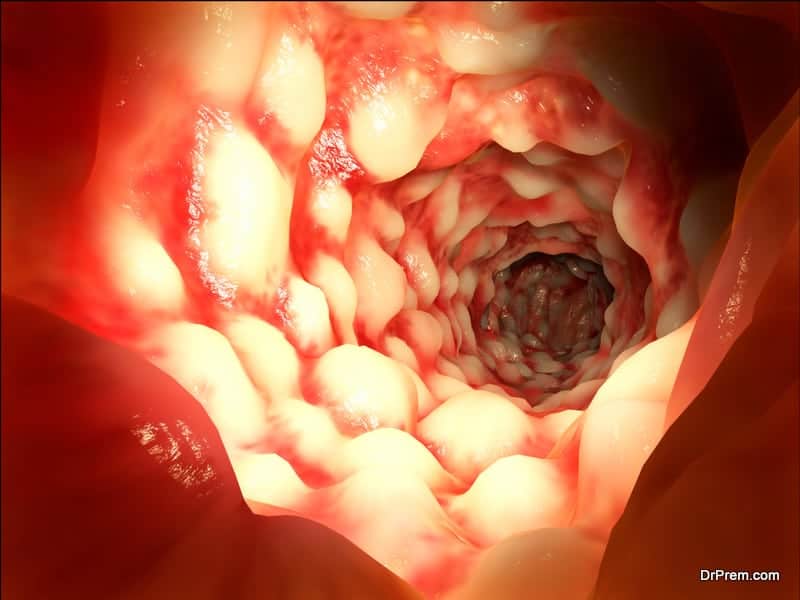Inflammatory bowel disease: Alternative Medicine
Top Alternative Medicine
1. Garlic
Being a great anti-inflammatory and anti bacterial agent, garlic is great for treating a host of common ailments. While it reduces inflammation, bacterial action and infection, it may not be a great treatment method when you have fever as garlic can aggravate fever and pain because it is very hot. Fever and pain too can sometimes be caused due to inflammatory bowel disease and in such cases you must not use garlic for treatment. However, garlic is good for mild inflammatory bowel disease as it activates the immune system. Take 4-5 cloves everyday for treating inflammatory bowel disease. Garlic can be taken in the form of pills as well, if you want to avoid the offensive odor associated with it. For preparing a tea, crush 4-5 cloves of garlic and add to a cup of boiling water. Steep for about 10 minutes before drinking it.
2. Capsaicin
Capsaicin is a compound that is present in chilli peppers and is known to be a wonderful remedy for treating heart problems and cholesterol and also for masking pain, bloating, diarrhoea and abdominal cramps. The intake of capsaicin helps in reducing the effectiveness of cellular compounds involved in pain transmission from the skin surface to the spinal cord. It also has great healing powers that help patients with inflammatory bowel disease and many other diseases of the body. Take a teaspoon of chilli pepper everyday along with a glass of warm water. It can also be added in your diet. Capsaicin pills can be bought from drug stores without prescription. However, a herbalist will have to be consulted in order to check the right dosage. This treatment should be avoided if you have problems like heartburn, acidity, etc.
3. Lemonade diet
A lemonade diet is recommended as a detoxification diet that helps in relieving inflammatory bowel disease and its symptoms. The diet involves the intake of only liquid foods for about ten days to relieve the pain, inflammation and other symptoms associated with inflammatory bowel disease. Make a mixture of lemon juice, cayenne pepper, maple syrup and some mineral water and drink this every day for ten days, until you get relief completely from the symptoms. As the treatment does not have any side effects, it can be undertaken as a trial as well. You must ensure that you are not on this diet for more than ten days.
4. Aloe vera
Aloe gel is a wonderful anti inflammatory agent and healing remedy and can be used for a number of disorders that can be external as well as internal. Aloe juice is best for mild to moderate cases of inflammatory bowel diseases. This is because it is an immune booster and when patients with severe inflammatory bowel disease takes an immune booster, their already over active immune system can wreak havoc with their aggravated condition. However, aloe vera has great healing properties and helps in attaining instant relief when the condition is mild to moderate. Take fresh aloe juice twice a day for best results.
5. Fish oils
Being a rich source of omega 3 fatty acids, fish oils are excellent for overall health of the body, with particular significance in cardiovascular health. Omega 3 fatty oils present in fish oils have anti inflammatory properties and also help the body gain immunity and resistance from free radical damage and diseases due to its antioxidant content. Taking a capsule of cod liver oil every day and including adequate seafood in your diet can help in treating ulcerative colitis and Crohn’s disease naturally. However, be wary of over consumption of certain fish due to the danger of toxic substances like mercury and dioxins from getting accumulated in the body, causing other health problems.
6. Evening primrose oil and borage oil
Both these oils are rich in gamma lineolic acid which helps in alleviating inflammatory conditions like inflammatory bowel disease, rheumatoid arthritis, etc. A recent research conducted on the efficiency of these oils suggests that borage oil has more gamma lineolic acid and hence is a more effective treatment method for treating inflammatory conditions. A teaspoon of either of these oils or quantities as per the herbalist’s recommendation should be sufficient for treating inflammatory bowel disease and also for preventing further episodes of the disease. Evening primrose oil should not be taken without the advice of your doctor if you are on medications for depression, high blood pressure, blood thinning, seizures, etc. as it may interact with these medications and reduce its effectiveness.
7. Peppermint oil
The cooling properties of peppermint help in reducing the abdominal cramps and bloating which are associated with inflammatory bowel disease. Peppermint can also mask the pain caused by IBD as it has a numbing effect on the entire body. Taking peppermint also helps in the relaxation of the gastro-esophageal sphincter, thereby easing the pain and relieving the flatulence. Take a teaspoon of peppermint oil every day for relief. Results can surface as early as 4 weeks of continuous intake of peppermint oil. However, peppermint oil can irritate the stomach and hence it is better to take it as a herb rather than taking the oil in its concentrated form. Again, a herbalist will have to check the condition and assess the dosage that is right for the severity of your condition.
8. Probiotics
The role of probiotics is very important in treating stomach related disorders and infections. Probiotics work by destroying the bad bacteria in the stomach and protects the lining of the stomach, thereby giving resistance to the body for fighting diseases, especially the ones centered around the stomach. Use of probiotics becomes much more significant for treating pouchitis which is the inflammation of the new rectum created after a protocolectomy surgery, which is done for patients suffering from severe inflammatory bowel disease like ulcerative colitis. You can take 2-3 cups of fresh yoghurt with live culture everyday to control inflammatory bowel disease. Probiotics will also relieve the diarrhea associated with the intake of antibiotics for treating inflammatory bowel disease. The great thing about probiotics is that they can be used along with other natural or conventional treatments so that the patient’s immunity and digestive health can be improved even while he/she takes other forms of treatment.
9. Blond psyllium
Patients who have undergone rectal surgery due to inflammatory bowel disease get great relief through the use of blond psyllium as it acts as a softening agent for the bowels, thereby releasing pain and friction while passing stools. Due to this very reason, blond psyllium is also a natural remedy for treating irritable bowel syndrome, haemorrhoids, dysentry, etc. Blond psyllium works in the same manner as the drug mesalamine which is commonly prescribed for the treatment of inflammatory bowel disease. The psyllium husk, when consumed absorbs water and expands, thereby stimulating bowel movement when you have constipation. For patients who have symptoms of diarrhea associated with IBD, consumption of psyllium husk reduces bowel movement. For dosages that are adequate for you, a herbalist will have to assess your condition before the treatment starts.
10. Wheatgrass
At times, lack of adequate nutrition can aggravate the symptoms associated with inflammatory bowel disease. Wheatgrass is a wonderful and nutritious remedy for treating ulcerative colitis naturally, without the accompaniment of other medications and surgery. Wheatgrass is packed with vitamins and minerals that are essential for the body and strengthening the digestive tract. Vitamins like vitamin A, vitamin E and vitamin C, and minerals like iron, magnesium and calcium that are present in wheatgrass help in reducing the swelling and speeding up the healing process. These vitamins are not only essential for digestive health, but for the normal functioning of the whole body as well. Again, it is important to consult a herbalist before you take wheatgrass in order to rule out interactions with other conditions.
11. Acupuncture
This ancient Chinese method of treatment use needles which are targeted at certain specific energy points located in the body so that the imbalance caused in the energy points are rectified and the patient immediately feels better and recovers from the condition. A registered acupuncturist should be consulted for acupuncture as the method can cause disastrous results and severe organ damage if not done by an experienced person. The treatment also requires several sittings for the results to show. As all treatment methods have varying results on every individual, acupuncture too has varied results based on the patient’s physical condition.








